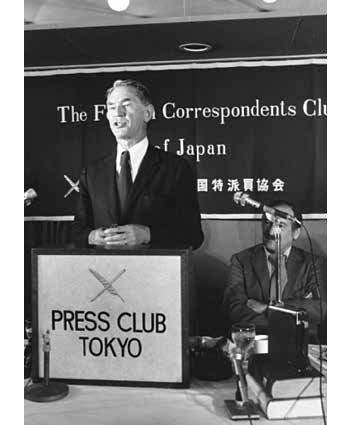Issue:

On Nov. 14, 1974, former U.S. Ambassador to Japan Edwin O. Reischauer shared with our members his views on a tumultuous year which had been highlighted by Prime Minister Tanaka’s appearance at the Club a month earlier. Seated next to him is FCCJ President Max Desfor (AP). After reading Reischauer’s 1960 treatise on Japan, President John F. Kennedy selected him as ambassador, a position he held for five years from 1961 to 1966. The Club was not only a venue for many Reischauer appearances, but even earlier, in 1956, was where he was introduced by James Michener to Haru Matsukata. Matsukata, the correspondent for the Saturday Evening Post, and grand-daughter of a Meiji era prime minister, became his second wife.
Born in Tokyo on Oct. 15, 1910, the son of missionaries, Reischauer received his early education at The American School in Japan before going on to higher education in the U.S. He graduated from Oberlin and then Harvard, which led to a 40-year teaching career at the latter that centered on East Asian history and culture. He was author and co-author of many scholarly articles during his lifetime. With the advent of WWII, he pushed for participation by Japanese-Americans in the U.S. military and later called for a postwar plan for peace in Asia that would involve Japan. During the war, he also assisted the U.S. military as both a language instructor and translator of decoded Japanese military messages.
As the new ambassador, Reischauer and his wife were warmly received in 1961 by both the government elite and the population at large. His arrival coincided with Japan’s transition from a poor country recovering from WWII into a major world economy that pulled it abreast of Britain by the end of his tenure in 1966. It was a pivotal time. Reischauer has been lauded for his contribution in ending the U.S. Occupation mentality and strengthening political ties between Washington and Tokyo. He supported Japan’s rapid economic recovery, which he believed would create a strong middle class and make it a peace-loving democratic country. His critics, on the other hand, say that he failed to thwart Japan’s excessive barriers to free trade, both tariff and non-tariff, that encouraged a trend toward mercantilism.
In 1964, Reischauer was stabbed in the thigh by a deranged Japanese youth and subsequently received blood transfusions at the nearby Toranomon hospital. Unfortunately, some of the blood was contaminated, resulting in hepatitis that would have a negative impact on his life over the next 26 years. He died of complications in September of 1990, one month before his 81st birthday.
Charles Pomeroy is the editor of Foreign Correspondents in Japan, a history of the Club that is available at the front desk.

